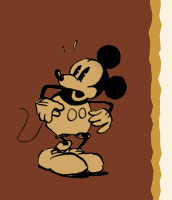Joel Beck's Comics and Stories compiles most of the stories from three of the earliest comic books in underground history:
Lenny of Laredo (1965),
The Profit (1966), and
Marching Marvin, the Red Watcher! (1966). As these books are relatively rare and quite expensive, it's nice to have an affordable comic that gathers the best of Joel Beck's pioneering books in one publication.
Joel Beck grew up in a small town north of Oakland, California, his childhood marred by a battle with spinal meningitis. As a young boy, he was bedridden for three years, during which he was constantly drawing and cartooning. Beck never graduated from high school, but as a teenager in the early '60s his cartoons were published in the University of California campus newspaper,
The Pelican. In 1965, he produced
Lenny of Laredo, which went through three small printings within a year (the last by The Print Mint; Don Schenker's first comic book job). That same year, Beck was chosen by a national panel of humor magazine editors as the Top College Cartoonist (ironic for a high-school dropout), which Beck proudly trumpeted on the cover of his 1966 comic book,
The Profit.
After producing
Marching Marvin at the end of 1966, Beck wasn't heavily involved in the post-
Zap Comix frenzy of the late '60s, but he contributed to a number of underground anthologies throughout the '70s, including
San Francisco Comic Book, Yellow Dog, and
Snarf. He was spotlighted in
Ban Zai!, a terrific 1973 Kitchen Sink comic book that also featured Kim Deitch and Roger Brand.
Kitchen Sink printed 10,000 copies of
Joel Beck's Comics and Stories in 1977, providing renewed exposure to Beck's groundbreaking work from the mid '60s. The comic leads off with a funny cartoon on the inside front cover, "So You Want to Become an Underground Cartoonist!?" that was drawn specifically for this book, as was the three-pager that follows, "The Truth About Smokey the Bear!" In "The Truth," Beck reveals Smokey's degenerate behavior as a young cub and a teenager, running amok until he sets fire to the forest, killing hundreds of animals. His subsequent despair leads to an attempted suicide, but God intervenes, commands him to become a guardian of the forest, and the legend of Smokey the Bear is born. In the last three panels, Beck attempts to inject religious mockery into the story, but it's too little, too late for the taunting to inflict any damage. I understand that Beck's tongue is always firmly in his cheek, but at some point ya gotta tip your hand or we're gonna think your telling real fairy tales.
The rest of the book is comprised of the stories from the aforementioned mid '60s comic books, beginning with "Lenny of Laredo," a thinly veiled satire of foul-mouthed comedian Lenny Bruce. We provide a
full review of Lenny of Laredo on this site.
The next story is "The Profit," which is from the comic book of the same name. We also provide a
full review of The Profit on this site.
Joel Beck's Comics and Stories concludes with an often hilarious satire on morality and marketing entitled "Marching Marvin, The Red Watcher!" You betcha, we also provide a
full review of Marching Marvin on this site.
Joel Beck's Comics and Stories is a great comic book that offers some of Beck's most insightful and funny work, made all the more remarkable when you realize he produced all three of these stories before he was 24 years old. His ink and brush work is very assured for such a young man, and combined with his irreverent sense of humor he seems like the type of cartoonist who would've fit right in with
Mad magazine in the '60s and '70s. Except even Bill Gaines would not (and could not) have published stories with as much wickedness as Beck imbues in these comics. Oh sure, it's all tame by today's standards, but not back in 1966.
After 15 years of producing some of the best comics ever, Beck's productivity dropped significantly in the '80s and '90s as he suffered bouts with alcoholism and homelessness. Though his comic work slowed to a crawl, he was also an accomplished fine artist and produced many drawings and paintings in the last two decades of his life, including commissioned works for friends and collectors. Beck passed away in 1999 at the age of 56 due to complications from alcoholism and tuberculosis. Joel
Beck is one of the often-overloooked forefathers of the underground revolution, but his comics are still incisive and relevant to a broad range of today's social issues.


 HISTORICAL FOOTNOTES:
HISTORICAL FOOTNOTES:
Kitchen Sink printed approximately 10,000 copies of this comic book. It has not been reprinted.
Joel Beck was utterly broke in 1977 when Kitchen Sink published Joel Beck's Comics and Stories. In order to retrofit the original artwork from Lenny of Laredo, The Profit and Marching Marvin into the narrower format of Kitchen Sink's comic book, Beck and his lifelong buddy Roger Brand literally cut up the panels of the original art and rearranged them. Neither Beck nor Brand had the money to make copies of the artwork and cut up the copies. Their dissection of the Beck's original art was discovered by Bob Beerbohm a few years late.r when he acquired most of the original art from Beck when Beck was, as always in his later years, desperate for money.
 COMIC CREATORS:
COMIC CREATORS:
Joel Beck - 1-36
Peter Poplaski - 1 (color) 






























